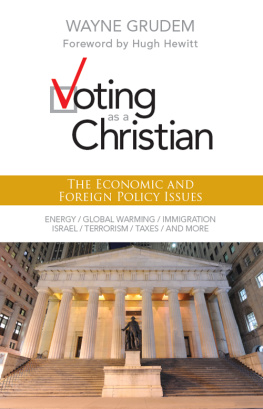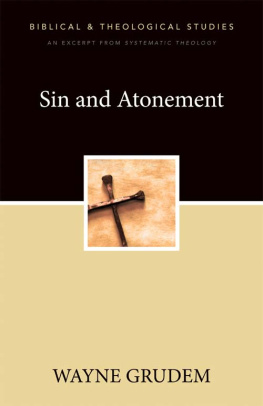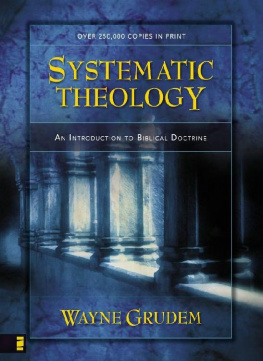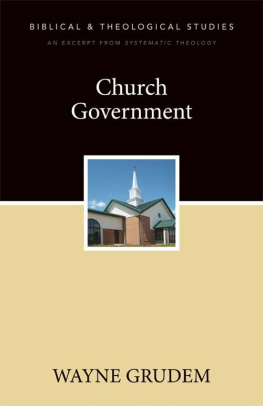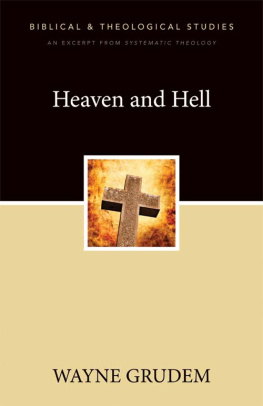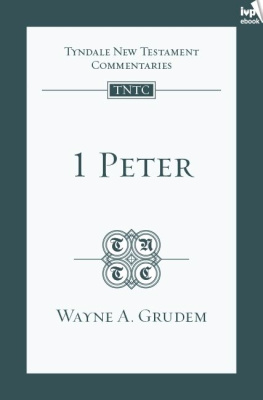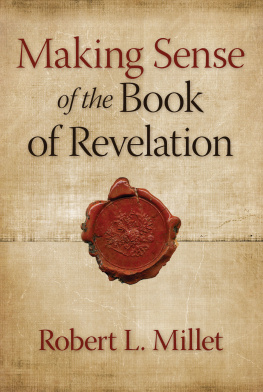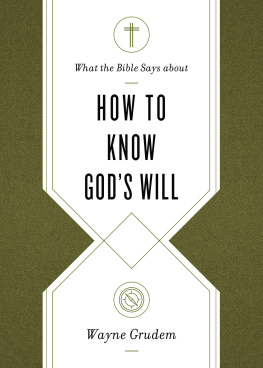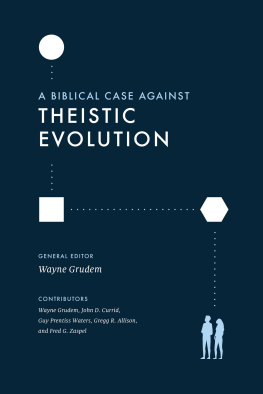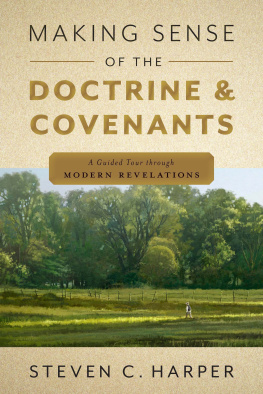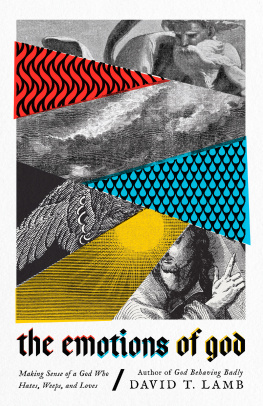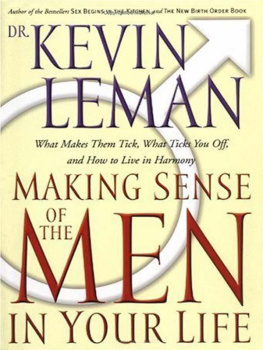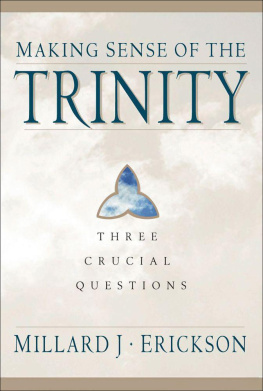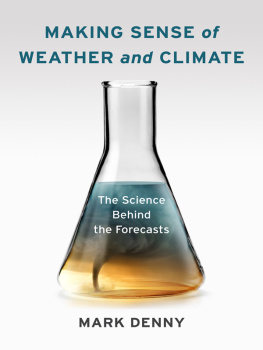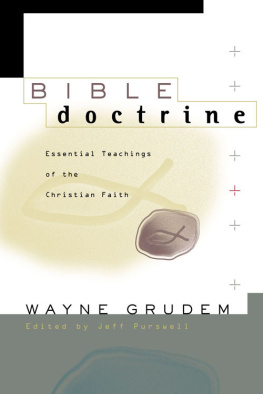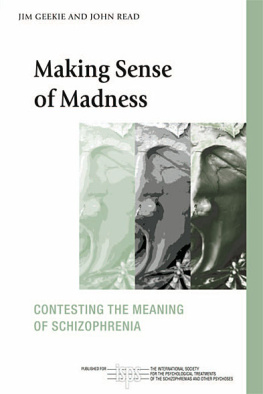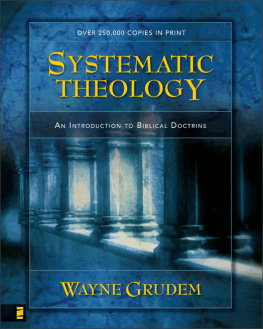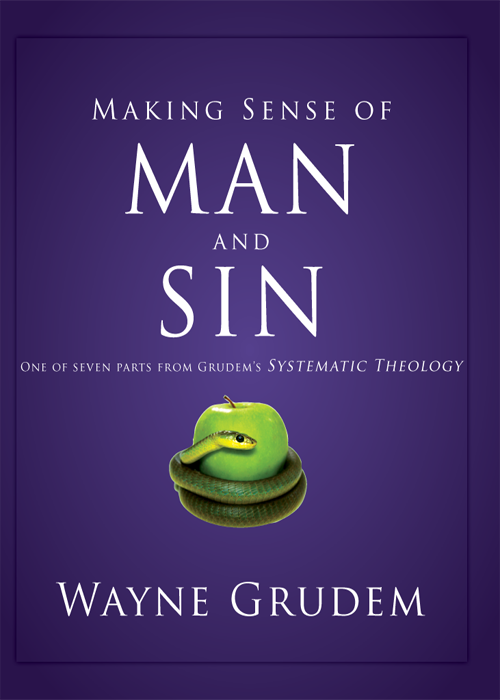M AKING S ENSE O F
MAN
AND
SIN
O NE OF S EVEN P ARTS F ROM G RUDEMS
S YSTEMATIC T HEOLOGY
WAYNE GRUDEM

Contents
I have not written this book for other teachers of theology (though I hope many of them will read it). I have written it for studentsand not only for students, but also for every Christian who has a hunger to know the central doctrines of the Bible in greater depth.
I have tried to make it understandable even for Christians who have never studied theology before. I have avoided using technical terms without first explaining them. And most of the chapters can be read on their own, so that someone can begin at any chapter and grasp it without having read the earlier material.
Introductory studies do not have to be shallow or simplistic. I am convinced that most Christians are able to understand the doctrinal teachings of the Bible in considerable depth, provided that they are presented clearly and without the use of highly technical language. Therefore I have not hesitated to treat theological disputes in some detail where it seemed necessary.
Yet this book is still an introduction to systematic theology. Entire books have been written about the topics covered in each chapter of this book, and entire articles have been written about many of the verses quoted in this book. Therefore each chapter is capable of opening out into additional study in more breadth or more depth for those who are interested. The bibliographies at the end of each chapter give some help in that direction.
The following six distinctive features of this book grow out of my convictions about what systematic theology is and how it should be taught:
1. A Clear Biblical Basis for Doctrines. Because I believe that theology should be explicitly based on the teachings of Scripture, in each chapter I have attempted to show where the Bible gives support for the doctrines under consideration. In fact, because I believe that the words of Scripture themselves have power and authority greater than any human words, I have not just given Bible references; I have frequently quoted Bible passages at length so that readers can easily examine for themselves the scriptural evidence and in that way be like the noble Bereans, who were examining the scriptures daily to see if these things were so (Acts 17:11). This conviction about the unique nature of the Bible as Gods words has also led to the inclusion of a Scripture memory passage at the end of each chapter.
2. Clarity in the Explanation of Doctrines. I do not believe that God intended the study of theology to result in confusion and frustration. A student who comes out of a course in theology filled only with doctrinal uncertainty and a thousand unanswered questions is hardly able to give instruction in sound doctrine and also to confute those who contradict it (Titus 1:9). Therefore I have tried to state the doctrinal positions of this book clearly and to show where in Scripture I find convincing evidence for those positions. I do not expect that everyone reading this book will agree with me at every point of doctrine; I do think that every reader will understand the positions I am arguing for and where Scripture can be found to support those positions.
This does not mean that I ignore other views. Where there are doctrinal differences within evangelical Christianity I have tried to represent other positions fairly, to explain why I disagree with them, and to give references to the best available defenses of the opposing positions. In fact, I have made it easy for students to find a conservative evangelical statement on each topic from within their own theological traditions, because each chapter contains an index to treatments of that chapters subject in thirty-four other theology texts classified by denominational background.
3. Application to Life. I do not believe that God intended the study of theology to be dry and boring. Theology is the study of God and all his works! Theology is meant to be lived and prayed and sung! All of the great doctrinal writings of the Bible (such as Pauls epistle to the Romans) are full of praise to God and personal application to life. For this reason I have incorporated notes on application from time to time in the text, and have added Questions for Personal Application at the end of each chapter, as well as a hymn related to the topic of the chapter. True theology is teaching which accords with godliness (1 Tim. 6:3), and theology when studied rightly will lead to growth in our Christian lives, and to worship.
4. Focus on the Evangelical World. I do not think that a true system of theology can be constructed from within what we may call the liberal theological traditionthat is, by people who deny the absolute truthfulness of the Bible, or who do not think the words of the Bible to be Gods very words. For this reason, the other writers I interact with in this book are mostly within what is today called the larger conservative evangelical traditionfrom the great Reformers John Calvin and Martin Luther, down to the writings of evangelical scholars today. I write as an evangelical and for evangelicals. This does not mean that those in the liberal tradition have nothing valuable to say; it simply means that differences with them almost always boil down to differences over the nature of the Bible and its authority. The amount of doctrinal agreement that can be reached by people with widely divergent bases of authority is quite limited. I am thankful for my evangelical friends who write extensive critiques of liberal theology, but I do not think that everyone is called to do that, or that an extensive analysis of liberal views is the most helpful way to build a positive system of theology based on the total truthfulness of the whole Bible. In fact, somewhat like the boy in Hans Christian Andersens tale who shouted, The Emperor has no clothes! I think someone needs to say that it is doubtful that liberal theologians have given us any significant insights into the doctrinal teachings of Scripture that are not already to be found in evangelical writers.
It is not always appreciated that the world of conservative evangelical scholarship is so rich and diverse that it affords ample opportunity for exploration of different viewpoints and insights into Scripture. I think that ultimately we will attain much more depth of understanding of Scripture when we are able to study it in the company of a great number of scholars who all begin with the conviction that the Bible is completely true and absolutely authoritative. The cross-references to thirty-four other evangelical systematic theologies that I have put at the end of each chapter reflect this conviction: though they are broken down into seven broad theological traditions (Anglican/Episcopalian, Armin-ian/Wesleyan/Methodist, Baptist, Dispensational, Lutheran, Reformed/Presbyterian, and Renewal/Charismatic/ Pentecostal), they all would hold to the inerrancy of the Bible and would belong to what would be called a conservative evangelical position today. (In addition to these thirty-four conservative evangelical works, I have also added to each chapter a section of cross-references to two representative Roman Catholic theologies, because Roman Catholicism continues to exercise such a significant influence worldwide.)
5. Hope for Progress in Doctrinal Unity in the Church. I believe that there is still much hope for the church to attain deeper and purer doctrinal understanding, and to overcome old barriers, even those that have persisted for centuries. Jesus is at work perfecting his church that he might present the church to himself in splendor, without spot or wrinkle or any such thing, that she might be holy and without blemish (Eph. 5:27), and he has given gifts to equip the church until we all attain to the unity of the faith and of the knowledge of the Son of God (Eph. 4:13). Though the past history of the church may discourage us, these Scriptures remain true, and we should not abandon hope of greater agreement. In fact, in this century we have already seen much greater understanding and some greater doctrinal agreement between Covenant and Dispensational theologians, and between charismatics and noncharismatics; moreover, I think the churchs understanding of biblical inerrancy and of spiritual gifts has also increased significantly in the last few decades. I believe that the current debate over appropriate roles for men and women in marriage and the church will eventually result in much greater understanding of the teaching of Scripture as well, painful though the controversy may be at the present time. Therefore, in this book I have not hesitated to raise again some of the old differences (over baptism, the Lords Supper, church government, the millennium and the tribulation, and predestination, for example) in the hope that, in some cases at least, a fresh look at Scripture may provoke a new examination of these doctrines and may perhaps prompt some movement not just toward greater understanding and tolerance of other viewpoints, but even toward greater doctrinal consensus in the church.


